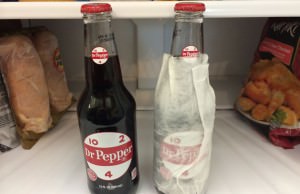DNA-Specialized Diets Are Becoming A Thing

Seeing as it’s the 21st century and scientific breakthroughs are not only uncommon, they are an everyday thing, we are very likely to be equipped with dispensers that deliver personalized prescriptions of nutritional supplements in our kitchen very soon. In fact, a daily dose may as well be squirted into our morning coffee by a friendly, robotic nutrition helper, according to a number of researchers. Some would even go as far as to claim that we will soon be able to receive all the nutrients we need neatly packed into a single piece of chocolate, presented by a 3D printer in our favorite shape.
While some of this may turn out to be mere speculations, there’s no denying the fact that with each passing day, genetic science takes us closer to a healthcare model aimed at preventing disease based on individual propensities rather than waiting to treat certain symptoms. Think about it for a second – a nutrition plan based on your very DNA, perfected for you and nobody else. Think of the benefits your body could reap from such an intricate diet. Personal nutrition is thought by some to be the holy grail of healthcare and people around the world are starting to realize how important a factor it can be in maintaining one’s health.
In case you aren’t aware (and a lot of people aren’t), there is already a vast amount of commercial online nutrigenetics services such as NutriFit and DNAFit, to whom you can send a saliva swab or even a ‘23andme’ DNA test and they say they can do miracles with that. DNAFit, for instance, claims they look at 45 gene variants to see whether a person is lactose intolerant, alcohol, coffee, carbohydrate, or saturated fat sensitive, or whether they have an increased need for B and D vitamins, omega-3, antioxidants, etc. With the help of information such as that, they compile shopping lists for you to frame in gold and marble, for they have sent you your holy grail and you would do well to follow the rules.
 We admit that all of this sounds mouth-wateringly impressive, but you could say that the concept is far from finished. According to Keith Grimaldi, chief scientific officer of DNAFit, the results are still in the phase of being more probabilities than clear and precise, black and white results that an individual can rely on.
We admit that all of this sounds mouth-wateringly impressive, but you could say that the concept is far from finished. According to Keith Grimaldi, chief scientific officer of DNAFit, the results are still in the phase of being more probabilities than clear and precise, black and white results that an individual can rely on.
Here’s what he said:
“For an SNP to be included in our nutrigenetic screen, it has to have been studied in specific gene-diet interaction studies.”
Translated into comprehensible English, this means that they have to conduct hundreds, if not thousands of additional tests before they can be sure of the results they are getting. John Hesketh, a molecular biologist at the University of Newcastle medical school, is not convinced that we know enough to effectively produce diets based on gene testing.
To quote him:
“The data that is coming out is complex. In many cases, we are still trying to identify the main genetic variants that might affect cancer risk, heart disease risk, and whether genetic variants in combination with particular diets might affect that risk.”
 The web-based consumer nutrigenetics companies mentioned before are still limited to simply offering a lifestyle service rather than strictly regulated and concrete medical advice. Their bespoke diets are, in fact, subtly tweaked versions of the standard nutritional guidelines you can find lying around the Internet in ample amounts. Don’t think of them as being useless, though, because the thousands upon thousands of nutritional guides available to all are everything but personalized – you usually end up salvaging 30% of them for your own needs and ditching the rest. With this, you can be sure they will be tailored to your exact needs.
The web-based consumer nutrigenetics companies mentioned before are still limited to simply offering a lifestyle service rather than strictly regulated and concrete medical advice. Their bespoke diets are, in fact, subtly tweaked versions of the standard nutritional guidelines you can find lying around the Internet in ample amounts. Don’t think of them as being useless, though, because the thousands upon thousands of nutritional guides available to all are everything but personalized – you usually end up salvaging 30% of them for your own needs and ditching the rest. With this, you can be sure they will be tailored to your exact needs.
Additionally, diet experts would be the first to say that nutrigenetics isn’t a damp squib. According to José Ordovás, director of nutrition and genomics at Tufts University, mankind has gained a lot of ground on defining proper diets thanks to the research nutrigenetics organizations have pulled through. Take the whole Mediterranean VS low-fat diet thing that’s been going on for quite some time now.
A five-year study of 7,000 people has successfully shown that people who carry two copies of the genetic mutation that enables diabetes to manifest and who were on a low-fat diet at the time were almost three times as likely to have a stroke as those with one or no copy. Respectfully, carriers who increased their nut and olive oil consumption (which are, by the way, key components of the Mediterranean diet) completely neutralized their risk.









